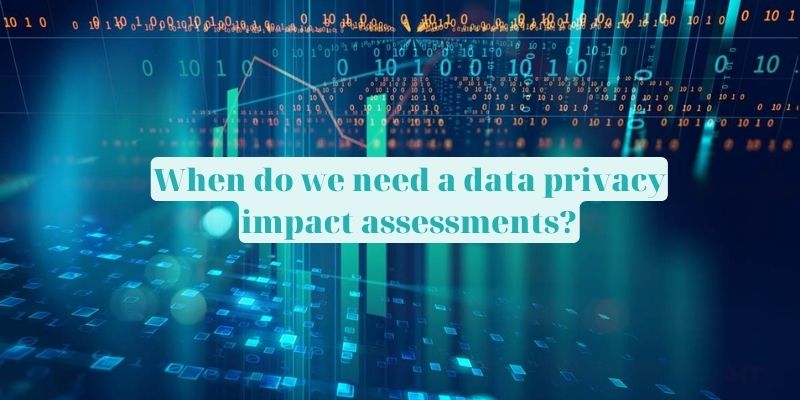A data privacy impact assessments can help you discover and reduce data protection concerns by providing a systematic, thorough analysis of your processing.
DPIAs should take into account risks to compliance as well as larger dangers to people’s rights and freedoms, such as the possibility of any significant social or economic harm. The potential for harm, whether physical, non-physical, or both, to people or to society as a whole is the main focus.
A data privacy impact assessments must take into account both the likelihood and the seriousness of any impact on individuals in order to determine the level of risk.
It is not necessary for a data privacy impact assessments to state that all hazards have been eliminated. However, it should assist you in identifying them and determining whether or not any unavoidable risks are acceptable.
DPIAs are mandated by law for processing that is thought to have a high level of risk. However, a successful DPIA can also have wider compliance, monetary, and reputational benefits, aiding in accountability demonstration and fostering individual participation and confidence.
A data privacy impact assessments could be used to analyze a single processing operation or a collection of related processing processes. A joint data privacy impact assessments can be performed by several controllers.
It’s crucial to integrate DPIAs into your organizational procedures and make sure the results can have an impact on your strategy. A data privacy impact assessments is a continuous process. It should be viewed as a continual process that is periodically reviewed. In this article, earbudscity.com will explore 4 overview of data privacy impact assessments.
When do we need a data privacy impact assessments?
Any processing that is “likely to result in a high risk” must first undergo a data privacy impact assessments. This means that even while you have not yet determined the real amount of risk, you still need to look for indicators that could have a significant, widespread impact on people.

The UK GDPR specifically states that you must conduct a DPIA if you want to:
- utilize deep and thorough profiling with impactful results;
- large-scale processing of special category or criminal offense data;
- systematically and broadly observe areas that are open to the public.
You should take into account the pertinent European criteria when determining whether your processing is likely to produce high risk. These outline nine parameters for processing processes with a high likelihood of risk. Even while the rules state that, in most situations, each processing procedure involving two or more of these criteria requires a DPIA, you may want to think about your situation where simply satisfying one of these requirements would be enough to warrant one.
A DPIA is additionally required by the ICO if you intend to:
- utilize cutting-edge technology (together with any of the criteria from the European guidelines);
- deciding on service access using profiling or special category data;
- a thorough person profile;
- process biometric information (in conjunction with any of the European guidelines’ criteria);
- process genetic information (in conjunction with any of the European guidelines’ criteria);
- matching or combining data from many sources;
- acquire personal information without giving the subject a privacy notice from a source other than the subject (referred to as “invisible processing”), in conjunction with any of the conditions from the European guidelines;
- track the whereabouts or behavior of people (in conjunction with any standard from the European guidelines);
- Children may be profiled, or marketing or internet services may be targeted at them;
- process information that, in the case of a security breach, could jeopardize the person’s physical safety or health.
Additionally, you should seriously consider doing a data privacy impact assessments for any additional processing that is extensive, involves monitoring or profiling, determines who gets access to certain services or opportunities, involves sensitive data, or affects weaker people.
It is best practice to do a data privacy impact assessments for any significant new project involving the use of personal data, even if there is no clear indication of a possible high risk. The checklists can be used or modified to assist you in conducting this screening activity.
How do we carry out a data privacy impact assessments?
Before you begin your processing, a data privacy impact assessments should start early in the life of a project and continue throughout the planning and development phase. These actions ought to be covered:
If you have a data protection officer, you must consult with them for advice. Throughout this process, you should consult with individuals and other interested parties.

The method is intended to be adaptable and scalable. You can make your own, modify our sample DPIA template, or both. If you wish to make your own, you might want to look at the European recommendations that outline the requirements for a valid DPIA.
Although the UK GDPR does not mandate publication of a DPIA, you should seriously examine the advantages of doing so. Publication can foster confidence and trust in addition to serving as a sign of compliance. Therefore, we advise that you publish your DPIAs as possible, if necessary excluding sensitive information.
Do we need to consult the ICO?
You are not required to give the ICO every DPIA, and we anticipate receiving a small portion of them. However, if your DPIA reveals a high risk and you are unable to take action to decrease that risk, you must consult the ICO. You must first talk with us before you can start the processing.

If you want your project to move forward successfully, taking the effort to create a thorough DPIA may help you avoid delays down the road if you need to consult with the ICO.
You must send a copy of your DPIA to us.
Once we obtain the necessary data, we will typically react within eight weeks (although in complex circumstances, this time frame may be extended by another six weeks).
In a written answer, we will let you know whether the risks are tolerable or if further action is necessary. In some situations, we might warn you against processing because we believe it would violate the GDPR. In appropriate circumstances, we may give a formal warning or take steps to completely forbid the processing.




